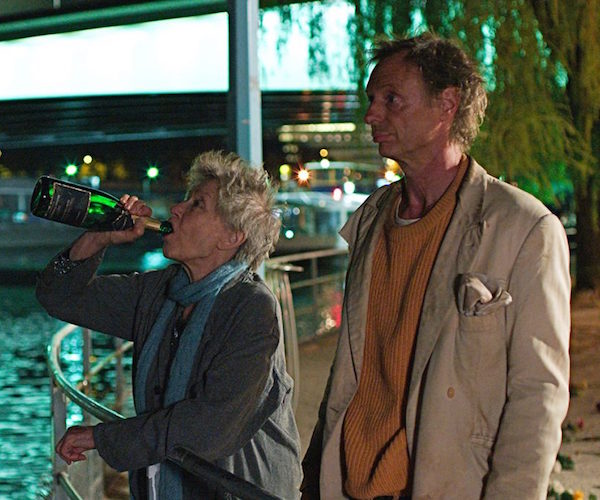Film Review: “Lost in Paris” — Earthy Yet Surreal Fantasy
Dominique Abel and Fiona Gordon’s vision tries to elevate the everyday to a realm of magic by way of the absurd.
Lost in Paris, directed by Dominique Abel and Fiona Gordon. At Dedham Community Theater, Dedham, MA

Emmanuelle Riva and Dominique Abel in “Lost in Paris.”
By Peg Aloi
At 83 minutes, the new comedy from Dominique Abel and Fiona Gordon is a breezy and often entertaining tale. This duo which writes, directs and produces together, had a previous arthouse success with 2011’s lighthearted love story The Fairy. Lost in Paris follows a similar formula of offbeat romance and choreographed movement set amid unlikely encounters and events. The film opens with a flashback to Fiona (Fiona Gordon)’s Canadian childhood in a small village that underwent harsh winters. Her aunt says she is moving to Paris, and Fiona says she’d like to go, too. Then, some thirty years later, Fiona, who works in what looks like a library, receives a letter from her Aunt Martha asking her niece to come visit Paris. Fiona immediately dons an orange rucksack topped with a Canadian flag and makes her way to the City of Lights, her blatant naivete and barely passable French seeming to charm others she meets.
But misfortune occurs almost immediately when, requesting a selfie from a passing stranger, she tumbles into the Seine and loses her backpack and her phone. Dom, a homeless man who sleeps in a bright green tent by the river, finds the pack (after fishing it out of the water via a contrived but hilarious series of moves), puts on Fiona’s bright yellow sweater, and uses her stash of cash to buy himself champagne and a fancy dinner at Maxim’s. Fiona, despondent after losing her things, somehow also finds herself in Maxim’s, and Dom, who fancies himself a sophisticated libertine, asks her to dance. The two share a very graceful tango. Dom is smitten but Fiona is shaken; the two part, with Dom determined to follow her and Fiona determined to find her Aunt Martha.
At 88, Aunt Martha (the always watchable Emmanuelle Riva) is forgetful but still physically spry. She is doing her best to escape visiting nurses, who want to put her in a home. She ends up vacating her apartment and wandering the streets of Paris, surviving by eating garbage and sleeping under bridges. This gives her something in common with Dom; they encounter each other, unaware they have Fiona in common. Martha also meets with a man closer to her own age, and the two share an affectionate dance routine: Abel and Gordon, both athletic and graceful to an almost intimidating degree (despite their portrayals as awkward misfits), dramatize the zany trajectory of their characters’ adventures via intricate movements reminiscent of Chaplin, with a dash of Ginger and Fred. Gordon wears large glasses and school-marmy clothes that still show off her lithe figure. She comes off as a sort of muscular Olive Oyl. Abel has the cute, scruffy but slightly creepy Frenchman thing down to a T.
At times the film feels slightly too precious. I found myself wondering why Fiona was so socially awkward and how Dom became homeless. Perhaps the earthy physicality of the film’s stars made me hunger for a narrative more grounded in reality. As with many comedies of this sort, the meet-cute conceits and odd coincidences drive the story forward, as when Martha and Fiona finally locate each other. Martha finds Fiona’s phone in the trash can (where the selfie-taking Parisian left it) and calls Fiona, who has found her way to Martha’s flat. Somehow these actions feel both unexpected and predictable at the same time, emanating a dreamy fable-like quality. And yet, when rustic sensuality occurs, an odd sequence in which some sexual fantasizing takes place, I found the doings somewhat off-putting (though some viewers might find it hilarious). Abel and Gordon’s vision tries to elevate the everyday to a realm of magic by way of the absurd. There are vivid homages along the way to a grander era of cinema; I’d have appreciated more references to films set in Paris, myself. Still, I appreciated the film’s physical energy, its colorful imagery, and its ultimately gentle view of humanity.
Peg Aloi is a former film critic for The Boston Phoenix. She taught film and TV studies for ten years at Emerson College, and currently teaches at SUNY New Paltz. Her reviews also appear regularly online for The Orlando Weekly and Diabolique. Her long-running media blog “The Witching Hour” has recently been moved to a new domain: themediawitch.com
Tagged: Dominique Abel, Emmanuelle Riva, Fiona Gordon, Lost in Paris
